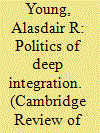| Srl | Item |
| 1 |
ID:
159603


|
|
|
|
|
| Summary/Abstract |
When the Transatlantic Trade and Investment Partnership (TTIP) negotiations were underway, its politics were distinctively transnational. Numerous alliances between European and American industry associations advocated an ambitious agreement to mitigate the effects of conflicting rules. Some civic interest groups also closely cooperated to shape the agreement, while a broad, loose transatlantic coalition of civic interest groups opposed it. The extent of transnationalism in TTIP was greater than what had come before in the transatlantic relationship and what is evident in contemporaneous analogous trade negotiations. This article argues that while the salience of a trade negotiation affects whether societal actors mobilize, it is not sufficient to prompt transnational cooperation. Rather transnational cooperation stems primarily from what the actors are seeking to achieve and whether they have a motive and opportunity to work together. By clarifying the conditions under which transnational cooperation is more likely, this article informs the emerging literature on the new politics of trade. By making the case that the motives to mobilize and cooperate require distinct analysis, it contributes to the literature on transnationalism.
|
|
|
|
|
|
|
|
|
|
|
|
|
|
|
|
| 2 |
ID:
159599


|
|
|
|
|
| Summary/Abstract |
Efforts to pursue ‘deep integration’—agreeing to international rules governing domestic policies to mitigate their adverse trade effects—have been pivotal to the politicization of trade policy. The contributions to this special issue focus on different political dynamics associated with recent high-profile efforts at deep integration. Collectively, they analyse the Transatlantic Trade and Investment Partnership (TTIP), the Comprehensive Economic and Trade Agreement (CETA), the Transpacific Partnership (TPP) and the Japan–European Union Economic Partnership Agreement (JEEPA) negotiations. The special issue, therefore, focuses on extreme examples of deep integration in order to illuminate new political dynamics. This introductory article introduces the concept of ‘deep integration’ and explores how it has been pursued in historical and contemporary trade negotiations. It also relates recent attempts at deep integration to the rise of populist anti-globalization movements. In light of these discussions, this article introduces the contributions to the issue. It concludes by considering whether the politics associated with TTIP and CETA in Europe represent the future of trade policy.
|
|
|
|
|
|
|
|
|
|
|
|
|
|
|
|
| 3 |
ID:
126626


|
|
|
|
|
| Publication |
2013.
|
| Summary/Abstract |
The European Union (EU) is one of the most important markets for developing countries, and trade policy has long been one of its most important instruments for promoting development. There is, however, a paradox at the heart of the relationship between the EU's trade policy and development. On the one hand the EU's trade as development policy has undergone a paradigm shift, the objective shifting from supporting the former colonies of the EU's member states to addressing poverty and with a greater emphasis on reciprocal liberalization. On the other hand, the EU's conventional trade policy initiatives-particularly its market access objectives in the Doha Round and in commercially motivated bilateral trade agreements-have adverse consequences for developing countries, as does its tendency to adopt stringent product regulations. We argue that this paradox is explained by differences in how much traction the emphasis on the development implications of trade has had in the EU's various trade policy subsystems.
|
|
|
|
|
|
|
|
|
|
|
|
|
|
|
|